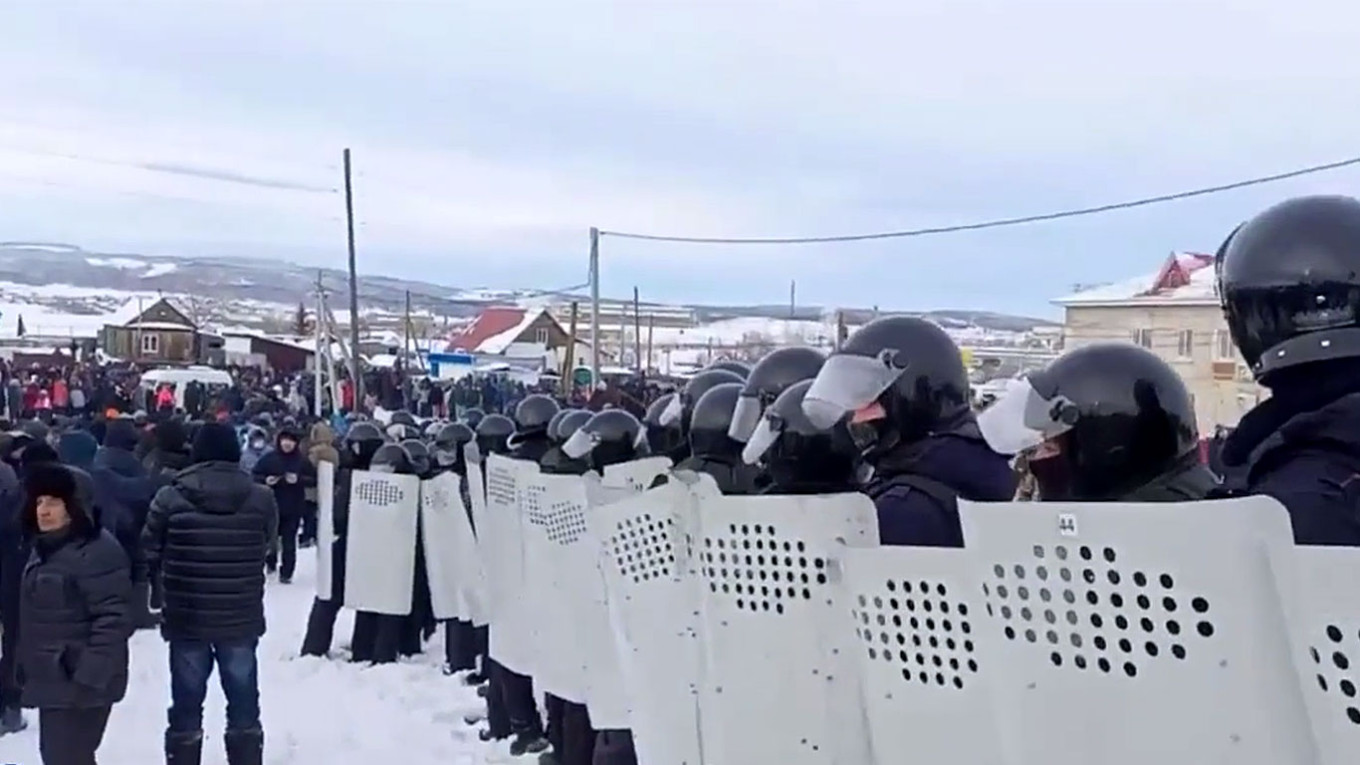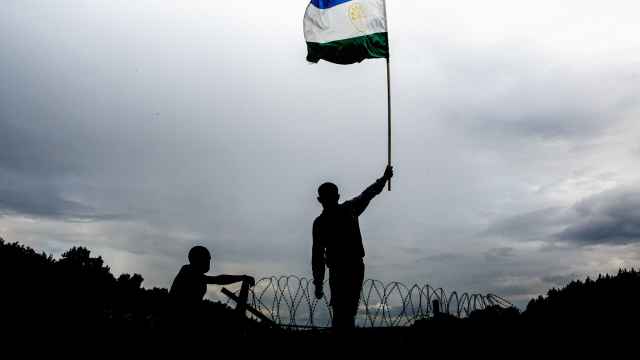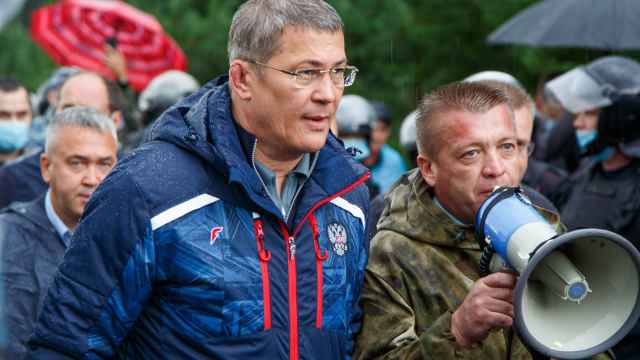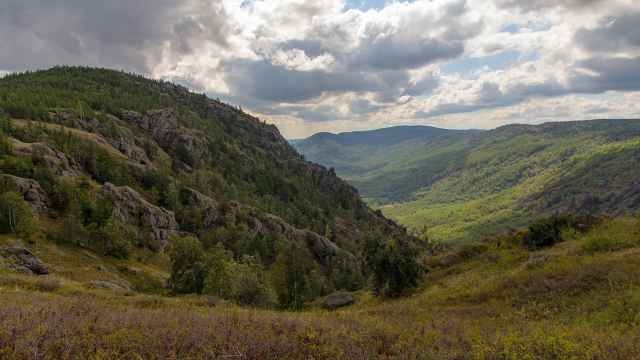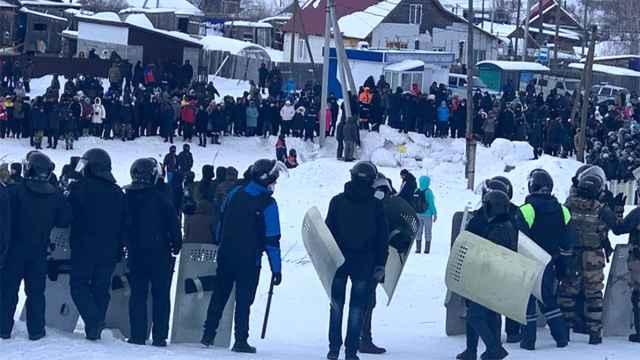This week, the republic of Bashkortostan became the epicenter of some of the largest street protests seen in Russia since the Kremlin invaded Ukraine nearly two years ago.
Thousands of people gathered outside a court in the town of Baymak on Monday and Wednesday in support of prominent Bashkir activist Fayil Alsynov, who was sentenced to four years in a penal colony on charges of “inciting interethnic hatred.”
Riot police reportedly used smoke grenades, tear gas and batons to disperse the crowd on Wednesday, injuring at least 40 people, and six protesters have been jailed.
The Moscow Times has gathered answers to some of the most pressing questions about the protests.
What is Bashkortostan?
Located between the Ural Mountains to the east and the Volga River to the west, Bashkortostan is Russia’s most populous ethnic republic with a population of more than 4 million people, according to the 2020 census.
It is home to representatives of 160 nationalities with Bashkirs, the indigenous Kipchak Turkic ethnic group, comprising 31.5% of the population. Russians and Volga Tatars are the two other largest groups in the republic, comprising 37.5% and 24.2% of the population respectively.
The republic is one of Russia’s largest industrial centers with a booming manufacturing industry and some of the richest deposits of natural resources in the country.
How unprecedented are this week’s protests?
Bashkortostan has a long history of protests over environmental and indigenous rights issues. But it is the 2020 protests in defense of Kushtau, a mountain in the region’s Ishimbaysky district, that first made international headlines.
The protests at Kushtau saw ordinary citizens, environmentalists and Bashkir national activists unite to oppose planned limestone mining by the Bashkir Soda Company (BSK), which would see the natural site considered sacred by many ethnic Bashkirs razed to the ground.
A days-long standoff between thousands of protesters and BSK’s security contractors and riot police ended in victory for protesters, and Kushtau was awarded the status of a protected natural territory.
Bashkortostan’s government became the owner of a controlling stake in BSK until 2022 when the company was sold to a firm linked to oligarchs Boris and Arkady Rotenberg, close confidantes of President Vladimir Putin.
Last year, residents launched new protests against gold-mining works in Bashkortostan’s southeastern Baymaksky and Abzelilovsky. Protesters said the projects threatened to destroy popular natural sights as well as harm freshwater supplies and local agriculture.
Who is Fayil Alsynov?
Alsynov, 37, has been engaged in activist work in Bashkortostan for over 15 years, speaking up in defense of the region’s sovereignty and the political and linguistic rights of its indigenous Bashkir peoples.
He has held membership in several Bashkir national organizations and movements. including serving as chairman of the Bashkir national organization Bashqort, which was outlawed by the Russian government in May 2020.
Outside of ethnic Bashkir circles, Alsynov became well known due to his participation in the Kushtau protests where he took on a leading coordinating role.
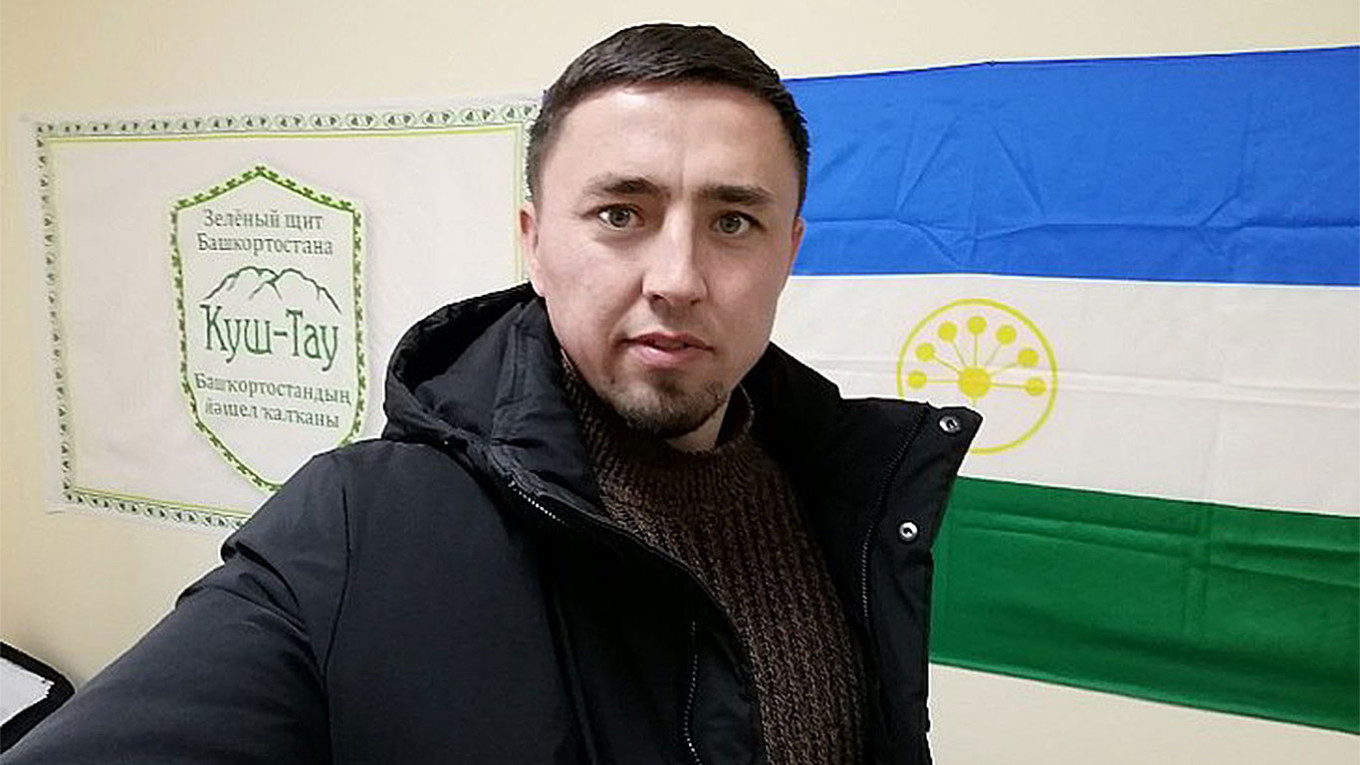
Why is he being targeted?
In April 2023, Alsynov joined the protests against illegal mining in the Baymaksky district and gave a speech that would become the basis of the criminal case against him.
Authorities claim that Alsynov “negatively assessed” migrant workers from the Caucasus and Central Asia and “violated” their “human dignity” by referring to them as “black people” in the speech. Pro-government forces also accused Alsynov of employing ethno-nationalist rhetoric and of calling for the expulsion of all non-Bashkirs from the republic.
Alsynov denied the accusations, saying his speech was “gravely mistranslated” from his native Bashkir language by a government-affiliated linguistic expert.
The activist also clarified that he “didn’t say that [non-Bashkirs] have no right to live or work” in the republic, but instead meant that it is Bashkirs who have to fearlessly protect their native lands as they have no other place to live.
“I don’t deny it, I said that Armenians, for example, can go back to their motherland. I also mentioned Tatars and Russians…If they want, they can live wherever they want, but Bashkirs have no other motherland,” Alsynov said in a Russian-language open letter to the republic’s head Radiy Khabirov.
An anonymous independent linguistic assessment published by his supporters confirmed that “kara halyk,” the idiom that Alsynov used, refers to “groups of people engaged in unskilled, hard labor” in Bashkir and other Turkic languages.
What does Bashkortostan’s leader have to do with this?
Khabirov, Bashkortostan’s Kremlin-appointed leader, was the sole author of a denunciation letter that became the basis for the case against Alsynov.
In the letter, which Alsynov obtained and published online, Khabirov refers to the activist as “the leader” of the anti-mining protest movement and accuses him of “openly calling on local residents to conduct extremist activities.”
Many observers and activists in Bashkortostan view the case against Alsynov to be Khabirov’s personal vendetta against him for his enduring popularity and the success of the Kushtau protests. Those protests dealt a huge blow to Khabirov’s popularity and compromised his standing with the Kremlin, including by prompting Putin to intervene.
How have officials reacted to this week’s protests?
In his first public comments about the protests, Khabirov on Thursday blamed the violence between protesters and police on separatists living abroad.
“A group of people, some of whom are abroad, who are in fact traitors, are calling for the separation of Bashkortostan from Russia. They are calling for guerrilla warfare here,” Khabirov said, singling out Ruslan Gabbasov, the exiled head of the Bashkir National Political Center.
“You can put on the mask of a good eco-activist and patriot, but in reality, the situation is not like that at all,” Khabirov added.
Kremlin spokesman Dmitriy Peskov and other Moscow-based officials have not yet commented on the events in Bashkortostan.
What is next?
Bashkortostan’s interior ministry has opened two criminal cases over the protests in Baymak.
It warned that participants could face up to 15 years in prison under the charges of “organizing and participating in mass unrest” or up to 10 years on charges of “using violence against a government official.”
At least eight protest participants were arrested during police raids in Bashkortostan on Thursday, according to the Idel.Realii news outlet.
Despite the intensifying crackdown, several Bashkir public figures have made calls for a new rally in the republic’s capital Ufa on Friday.
A Message from The Moscow Times:
Dear readers,
We are facing unprecedented challenges. Russia's Prosecutor General's Office has designated The Moscow Times as an "undesirable" organization, criminalizing our work and putting our staff at risk of prosecution. This follows our earlier unjust labeling as a "foreign agent."
These actions are direct attempts to silence independent journalism in Russia. The authorities claim our work "discredits the decisions of the Russian leadership." We see things differently: we strive to provide accurate, unbiased reporting on Russia.
We, the journalists of The Moscow Times, refuse to be silenced. But to continue our work, we need your help.
Your support, no matter how small, makes a world of difference. If you can, please support us monthly starting from just $2. It's quick to set up, and every contribution makes a significant impact.
By supporting The Moscow Times, you're defending open, independent journalism in the face of repression. Thank you for standing with us.
Remind me later.



